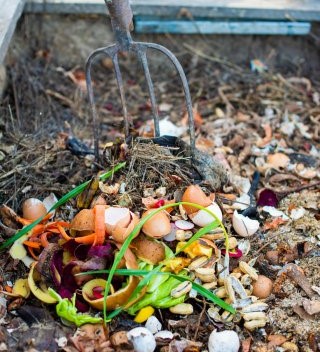Aerobic Composting and Climate Change
by Ron Prosek
The first half of March was pretty nice here in Northeast Ohio. Daffodils and some trees were blooming already. After St. Patrick’s Day, it seemed like winter was returning, but spring is here, and it WILL get warmer. So my thoughts, and those of many others, are already turning to backyard vegetable gardens. I’ve already planted my peas and my lettuce seeds.
As gardeners know, growing vegetables isn’t just a matter of planting in the spring and reaping in the summer and fall. In the spring there is the whole process of preparing your soil. Then comes the planting. And then comes the caretaking – watering when necessary, weeding, and fending off pests.
Eventually, the vegetables are harvested and consumed, and then we find there are bits and pieces left over – table scraps and garden waste. We put these into our composter to process for next year’s gardens.
But have you ever wondered if your composter was contributing to climate change? All that stuff in the compost bin is being processed by microbes. Surely, there must be some release of CO2, and wouldn’t there also be the release of other gasses that – things like methane, which is 80 times more powerful than CO2 as a heat absorber?
I did a little research and found out that besides CO2 and methane, composters can also release some quantity of N2O—nitrous oxide; and N2O is 300 times worse than CO2 as a greenhouse gas.
Don’t panic. Sounds like a bad situation, but it’s not really.
First, the amount of N2O released in the typical composter is quite small—so little that its climate impact is negligible. The thing you really need to think about is the release of methane from your composter, but this can be easily minimized.
You just have to realize that if you keep your compost stirred, it will be processed by aerobic microbes that do not release methane. If your compost remains unstirred and all packed together in an oxygen-free clump, anaerobic microbes will be the ones digesting it in this environment, and they will emit methane. So keep your compost stirred so the microbes that work in an oxygen-dominated environment can do their work and not release methane.
By composting, you are producing your own fertilizer for your garden. Also, you will be keeping a bunch of organic matter out of landfills. This is great for the environment because landfills are sealed, closed systems that process their organic contents anaerobically (without oxygen) and so produce considerable amounts of greenhouse warming methane.
According to the US EPA, methane released by U.S. landfills in 2022 accounted for 17.1% of the total U.S. anthropogenic methane emissions across all sectors. These greenhouse gasses were generated by food waste and organic matter that was dumped into landfills. Composting aerobically at home can significantly help reduce landfill emissions!
When you compost extra vegetation you actually increase organic matter in your soil and contribute to a net decrease of CO2 in the atmosphere, as the CO2 in your composted material came originally from the air, but composting puts some of this into the soil.
So welcome spring and a new composting season. Just be sure you have your pitchfork close at hand, and remember to turn your compost over at least once a week. Happy gardening!

